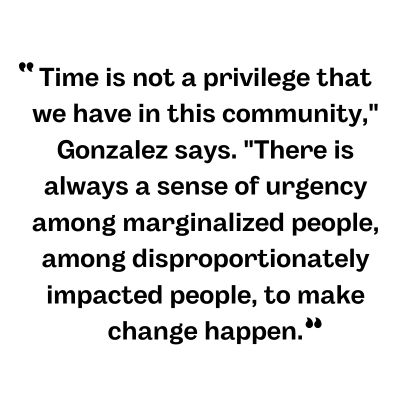Olga Gonzalez is the Executive Director of Cultivando, a women-run community resource for Latinx folks across Colorado. by Jackie Sedley.
Cultivando is a Latinx community resource based in Adams County, perhaps best known for its independent air monitoring around the Suncor refinery. Those efforts ended earlier this year, but by no means are their environmental justice efforts over. KGNU’s Report for America corps member Jackie sat down with Gonzalez over in Commerce City to discuss the monitoring results, the public response, and the current status of Cultivando’s efforts in light of a recent decline in funding.
-
 play_arrow
play_arrow
‘Time is not a privilege in this community’: Cultivando director puts out an SOS to stop ‘environmental genocide’ Jackie Sedley
When Olga Gonzalez stepped into her role as Executive Director of Cultivando – the women-led Latinx community resource based in Adams County – she was welcomed with a cloud of yellow smoke.
“It smelled horrible,” Gonzalez explains. “Schools went on lockdown as did businesses, because the amount of toxics that were in the air were dangerous to human health. It was an emergency situation. The families didn’t know what was happening. We didn’t know what was happening.”
After getting many calls from families asking her to explain the cause of the smoke, the community eventually traced it to Suncor – the refinery complex whose tall industrial chimneys dominate the Commerce City skyline.
This incident, bolstered by a slew of concerned parents, led Cultivando to think more deeply about their role in supporting these families as a health equity organization. They decided to take charge then and there.
In 2021, Cultivando received approval for two supplemental environmental project grants, totaling at $1.8 million. This money came from the Colorado Department of Public Health and Environment (CDPHE) out of their $9 settlement with Suncor for the refinery’s air pollution violations.
They used that money to fund their Air Quality Investigation and Research for Equity project, an environmental justice project that involved health impact studies, an environmental justice summer internship program, the making of a documentary set to come out in October, and an air monitoring initiative. They sought to collect data that would show which toxins are in the air, and if their findings supported what the community had been saying for decades – that they feel there is something in the air causing them harm.
After a year of monitoring, they announced elevated levels of pollution and radioactive particles in the air around the refinery.
“What was surprising to us was not what we foun d, what was surprising is that it seems that these government agencies have known that this is happening for decades and had done…nothing to very little,” Gonzalez says.
d, what was surprising is that it seems that these government agencies have known that this is happening for decades and had done…nothing to very little,” Gonzalez says.
Cultivando applied for another grant last year, this time from the Environmental Protection Agency (EPA) for $500,000. They were approved, but ended up buried under the burden of paperwork, bureaucracy, and other procedural requirements they simply did not have the time or resources to adhere to.
“Out of the $500,000, the air monitoring company would’ve sucked out 460,000. That would’ve left only 40,000 for Cultivando to do its year-long work, which is not equitable. It is not in accordance to all of the work that it requires, and it’s a reflection of how little government understands about the high level of expertise, time, and social capital it takes for organizations on the ground to do their work.”
Gonzalez says the pollution at air to this degree would not be happening in a more affluent community, and that poor communities of color and pollution often go hand in hand. She calls these disproportionate impacts on marginalized folks “environmental genocide.”

“Time is not a privilege that we have in this community,” Gonzalez says. “There is always a sense of urgency among marginalized people, among disproportionately impacted people, to make change happen. And the response from government and other institutions has always been, ‘Wait, it’s going to take time.’ And that’s really easy to say when they don’t live here and their children don’t live here.”
Gonzalez says the time is now for systemwide change, on a national and governmental level.
“I think for many of us, as indigenous people of this world, we have always been the caretakers of the places in which we live, and we are continuing in that. And so, my hope is that we will continue to not only care for the earth, but also work to heal the earth and heal ourselves and our relationships with one another…This is a topic that if there was ever a time where people said, ‘well, where should I jump in to the environmental justice space?’ This is the time. This is like emergency SOS. This has been going on for decades. This is an emergency that needs to be addressed now.”
-
 play_arrow
play_arrow
‘Time is not a privilege in this community’: Cultivando director puts out an SOS to stop ‘environmental genocide’ Jackie Sedley
Podcast: Play in new window | Download

















